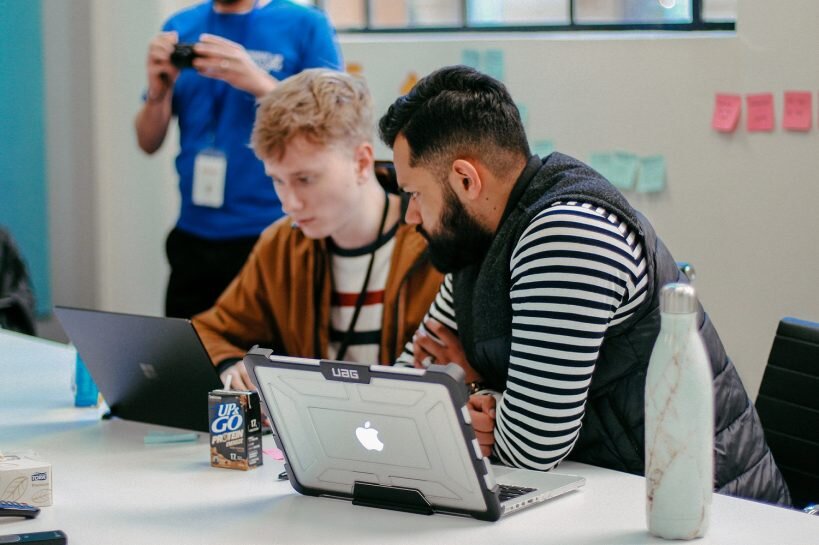How to talk to your employer about staying on after your internship
 As the midpoint for internships has zoomed past, now is a great time to be thinking about "what's next". Summer of Tech interns are often retained beyond summer, but moving yourself from an intern to employee can be a challenge.This post is aimed at interns (or students in non-permanent roles) who are keen to make their employment more permanent... read our tips below to help you approach the conversation with your boss.
As the midpoint for internships has zoomed past, now is a great time to be thinking about "what's next". Summer of Tech interns are often retained beyond summer, but moving yourself from an intern to employee can be a challenge.This post is aimed at interns (or students in non-permanent roles) who are keen to make their employment more permanent... read our tips below to help you approach the conversation with your boss.
What do you want?
Do you feel like you're a good fit for this organisation, and their work is exciting, motivating, and stretching you? What is your availability to work this year (full time? part time?), and are your longer term goals aligned with this role, and with their business goals? If not, then now is the time to think seriously about what you want to do next.There's no need to go overboard with a 3 year career plan, but think about what you've learned and the people you've worked with over the summer, is it a good fit?
What does your employer want?
You've been working with them over the summer, you should have got a feel for the organisation by now. Is this company or team growing? Is everyone busy, and do you feel like you've been contributing well to the work?They may have given you an indication at the start of your internship whether this role was ongoing or not. They may or may not have broached the subject with you about staying on. It's TOTALLY ok for you to bring up the topic if they haven't. And even if they said there was no chance that the role would continue, this is still a worthwhile conversation to have, if you truly want to stay. Things might have changed at their end, or they may change again soon. It's great to let them know that you're keen and what you can do before you leave and lose contact.We suggest leaving this until about three-quarters through your internship. Approach the conversation in a professional way that addresses your ambitions and their future staffing needs.
What can you do (for them)?
Before you raise the topic, have a think about why you're a good fit. What have you achieved over the summer? What can you point to as evidence of your contribution? How has your work improved since you started? How can you see it continuing to improve if they want to continue employing you?Treat the "next steps" conversation like a mini-job interview. You have a massive advantage over any other candidate. You know the people, you've done the work, and you have inside information about the role.But prepare for the conversation, think about the timing, who you're going to talk to, what you're going to say. Write some notes if that helps you collect your thoughts, but try and keep the conversation as an informal chat.
"Let's chat..."
Your manager is probably the best person to talk to. You could ask your mentor or a colleague's advice before you have the chat, but we suggest you make a specific time to talk to your manager or fit it into a regular catch up.Sorry, there's no script for this, but remember this is a business decision for them. You need to put your best foot forward and make a strong case for you to stay on the team. It's totally fine to start with a straightforward question about whether the role will continue. Weave in your evidence of awesomeness into the conversation. Maybe they just didn't think you'd want to stay, or maybe they've been distracted by projects and hadn't got around to thinking about plans for the new year yet.Remember - make sure they realize the value you've added over the summer, what you've learned, what you've contributed, and what you can do for them if you stay.
Dealing with Yes
If they say yes, woohoo! Congrats. The stars have aligned and they have an opportunity that matches your skills & potential. We suggest you treat this as a new beginning, AND a continuation of the learning and growing you've done so far. Learning doesn't stop when you have a real job...You will be negotiating a new employment contract, and you can expect to take on the responsibilities and benefits of being an employee (or a contractor, depending on how things work at their place). Our advice here is to get advice. Find out what the average/usual salary is for your kind of role, and understand the details of what your employment contract involves.MBIE's website has a lot of useful information about employment agreements, rights & responsibilities, here, and you can get good independent advice from a service like the Citizens' Advice Bureau, if you want to talk it through in more detail.Each employer is different, but we usually see a rise in hourly rate and/or benefits when a contract shifts from fixed-term to permanent. Remember, you're still inexperienced and they'll be investing time and resources into training you. Most IT companies say it takes about 18 months in a role before a graduate is delivering value as a permanent team member. That's a huge investment.
Dealing with No
If they say no, then that's an opportunity to ask for feedback. Try and understand what the reason is, and if there are areas you can work on over the next few months to have the conversation again. You know how they work, they've invested in you, you should definitely try and keep the door open. It's hard, but try and focus on the business, not personal reasons there might not be an opening for you. "No" now doesn't mean forever. Maybe they just don't have work available - that could change.Find out if there are any skill gaps in your work or areas you can improve. If you genuinely think you're a good fit for the organisation, then make sure you keep the door open. Be upfront about how you will stay focused on growing your skills, and ask if it's ok to touch base in a few weeks/months to see if any other opportunities are coming up.And don't forget to ask for a reference.It's REALLY good if you had this chat before the end of your role, so that if the answer is "No", you can go forth and apply for other jobs without having to feel sneaky about your current boss finding out. It is much better to be upfront and open about your next steps. You never know - if there's no space for you at this company, your manager might be able to refer you to somewhere else.
Plan B
Have a Plan B! Update your CV as you think about the next steps.It could be that you're returning to study, but if you've graduated, now is the time to actively apply for graduate and entry-level jobs! Think about the experience you've gained in this role, and how it would translate to other kinds of organisations and projects. We advise job-seekers to treat the hunt & application process like a full-time job. You'll need to do a lot of research, customise your CV and applications to the role and the organisation. Keep applying for roles until you have an ACTUAL job offer.Build your network and USE your network. Keep your skills alive & current by working on projects or doing online courses or short courses if you can afford the time and money. Find out about local or virtual meetup groups or industry events that are relevant to your next job. Attend these events if you can! The industry ones often have a student-priced ticket, and you can sometimes get in for free if you can give some of your time as a volunteer.New Zealand is a village, and the tech community is very well connected. Talking to people is the best way to find out about employment opportunities that might be suitable, and most people are generous enough to have a conversation and suggest some avenues for you.Good luck!
